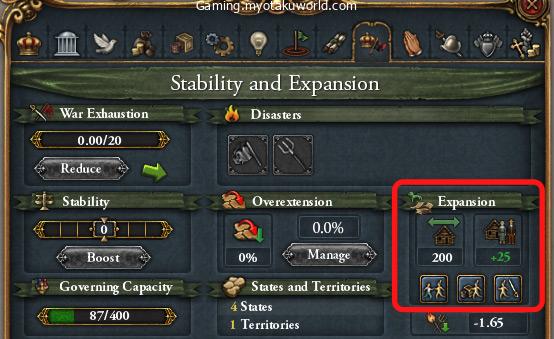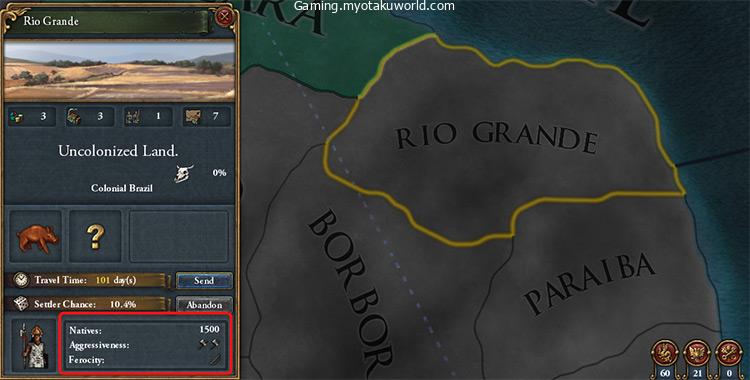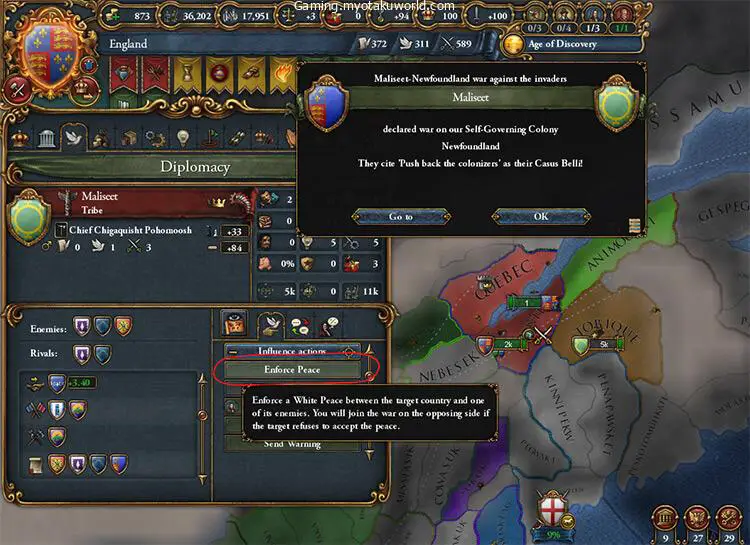Each month, the colonies will expand by themselves organically. Their rate of expansion is affected by a number of variables:
- Global Settler Increase
- Colonist’s Settler Chance
- Native Assimilation
- Province Climate (Arid, Arctic, or Tropical)
Consider amassing a large number of colonists and global settler increase modifiers if you plan on rapidly expanding throughout the New World and the Indies.
Both the Exploration and the Expansion groups contain a good number of them.
Colonial Foundation
Here’s how the colonial foundation process works:
Colonist Envoy
When establishing colonies, you’ll rely on a special kind of envoy known as a colonist. You can get three colonists from the two groups of thinkers who are interested in colonization:
From the Exploration
Two from Expansion
At Admin Tech 5, you get your first thought group slot, and at Admin Tech 7, you get another one.
Exploration is the best choice to make first.
It lets you hire adventurers and conquistadors, which you’ll need to find places that haven’t been settled yet. It also gives you more land to colonize, so your colonists can go to more faraway places.
Exploration and Expansion both let you bring about random events that help your cities.
From their national idea set, some countries also come with one more colonist:
| Nation | Status at the 1444 Start |
|---|---|
| Carib | Playable |
| Castile | Playable |
| Hadramut | Playable |
| Majapahit | Playable |
| Norway | Playable |
| Asturias | Releasable by Castille |
| Leon | Releasable by Castille |
| Nizhny Novgorod | Releasable by Muscovy |
| Andalusia | Formable |
| Australia | Formable |
| Iceland | Formable |
| Canada | Formable |
| Spain | Formable |
| United States | Formable |
| West Indies | Formable |
| Zealandia | Formable |
When you send colonists out to settle, they have a certain amount of time to get there. Depending on how far away their goal is from your capital, it could take them weeks or even years to get there.
Tip: The Influence (-25%) and Exploration (-20%) idea groups both have modifiers that cut the time it takes for an envoy to move.
When a colonist is called back to their home planet or has finished making a colony into a city, they will be able to go back to work in just one day.
Native Policy
Before you can start colonizing, you’ll need to set your local policy once you have your first colonist.
You can do one of three things:
- Natives living together: 0% chance of a native uprising
- Native Trading: -50% chance of natives rising up and +50% chance of natives becoming assimilated.
- Native Repression: +20 growth for the settlers
This is free the first time you do it. If you change policies later, your security will go down by -1.
Tip: The “Colonial Expansion” diplomacy policy is unlocked when you finish both “Exploration” and “Expansion.”
This will give you +20 settler growth and a -50% chance of a native revolt. “Native Coexistence” is not as good as “Native Trading” and “Native Trading” and “Native Coexistence” together.
Native Population and Assimilation
Except for desert islands, most uncolonized areas have people who were born and raised there.

There is a chance that they will attack your group once a month. Your local rising chance modifier can reduce this chance or make it go away completely.
If natives attack and take over your settlement, they will kill 100 of its people for every native regiment.
If the number of people in a colony drops to zero, it will be killed and you will have to start it up again.
In the Uncolonized Land UI, you can see how many native people live in a province.
- How big an uprising you might face depends on how many people live there.
- Each axe icon of violence equals a 1% chance of a monthly rise
- Each fury bow icon gives the natives a 0.2% military tactics bonus.
“Attack Natives” is a command you can give to an army. Repeatedly doing this can wipe out the original people, making it impossible for them to rise up.

But you shouldn’t do this unless you don’t have enough money to put troops in your colonies.
It’s better to get along with the locals and let them stay with your growing colony. Some of the natives may move to your town as a result of random events.
Also, once a colony becomes a city, its original people will be absorbed into the city. Depending on how many people live there, the city can get a bonus for how many things it makes:
Native Assimilation Bonus = Native Population ÷ 20000
For example, when a colony with 3000 people becomes a city, it can make 0.15 more things per month.
You can boost that prize even more with the following:
| Name | Type | Native Assimilation Modifier |
|---|---|---|
| Native Assimilation Act | Diplomatic Policy (Expansion + Humanist) | +50% |
| Establish New World Missions | Clergy Privilege | +50% |
| Native Trading Policy | Native Policy | +50% |
Global Settler Increase
Every month, new people move to the colonies. When there are 1000 people living there, that village will turn into a city.
The number of new people who move into a colony each month is based on how many people move there each year.
You get more than that based on your Diplomatic Tech Level:
| Diplomatic Tech Level | Global Settler Increase |
|---|---|
| 1 | +10 |
| 3 | +15 |
| 10 | +10 |
| 15 | +15 |
| 23 | +25 |
| 26 | +25 |
| 32 | +50 |
Civilized countries start at Diplomatic Tech 3, which means that there are 25 more settlers around the world.
If you want to keep up with other colonizers, like Portugal, you’ll need to get more modifiers for your global settler growth stat.
Here are the ones that most countries can use:
| Modifier Name | Modifier Type | Yearly Settler Increase |
|---|---|---|
| Grant New World Charters | Burgher Privilege | +10 |
| Nan Madoll (Micronesia, Southwest Pacific) | Great Project | +10–25 |
| Trading in Cotton | Strategic Trade Good | +20 |
| Native Repression | Native Policy | +20 |
| Colonial Expansion (Expansion + Exploration) | Diplomatic Policy | +20 |
| The Colonial Administration Act (Administrative + Exploration) | Diplomatic Policy | +10 |
| The Colonial Companies Act (Exploration + Plutocratic) | Diplomatic Policy | +10 |
| Native Assimilation Act (Humanist + Exploration) | Diplomatic Policy | +10 |
| Colonial Garrisons (Quantity + Expansion) | Military Policy | +10 |
| Faster Colonists | Expansion Idea | +20 |
| Land of Opportunity | Exploration Idea | +10 |
Note: Each of your colonies that isn’t next to one of your current cities will cost you -5. Provinces with conditions that are dry, cold, or hot will also get a -10 malus.
Settler Chance
Your towns also have a chance of adding 25 more settlers every month. This settler chance only works in towns where a colonist has already been chosen.
The base chance for each colony is 10%. This is changed even more by:
| Condition | Modifier |
|---|---|
| Colony Population | -1% per 100 settlers |
| Native Aggressiveness | -0.5% per point |
| National Production Efficiency | +0.2% per point |
| Colony and Capital Are in the Same Continent | +5% |
| Colony Has Your State Religion | +1% |
| Colony Has Your Primary Culture | +1% |
| Colony Is in Your Culture Group | +1% |
| “General Colonization Law” (Expansion Idea #6) | +5% |
| “The Pioneer Policy” (Expansion + Offensive) | +5% |
| “Benign Neglect” (Exploration + Innovative) | +5% |
| “The Colonial Administration Act” (Exploration + Administrative) | +5% |
| “Steppe Nomad Migrations” (Exploration + Horde) | +5% |
Colonial Maintenance
Every month, each colony costs 2 ducats. If you have more colonies than colonists, you’ll have to pay more than the usual 2 ducats.
The exact steps are:
Overhead per Additional Colony = 2 ⋅ x²
x is the number of extra colonies beyond your colonist count.
For example, if you have 5 colonies but only 3 people, the cost of the 4th colony will be 4 ducats and the cost of the 5th colony will be 10 ducats.
In the Economy tab, you can see how much it costs to maintain your colony.

Tip: A good way to grow quickly is to bring back colonists and send them to start new colonies elsewhere, as long as you can pay for the rising costs.
Colonial Nations

You’ll make a colonial country by default if:
- You have made five towns in a colonial area.
- Your capital is not in the same subcontinent as those five towns.
Note: All that is needed to make a colonial country is a core of territory. It’s a waste of Admin mana to turn towns into full state cores.
These are the areas that were chosen to be colonies:
| Subcontinent | Colonial Region |
|---|---|
| North America | Eastern America California Louisiana Caribbean Canada Cascadia Mexico |
| South America | Brazil Peru Colombia La Plata |
| Oceania | Australia |
Note that each colonial area can only have one colonial nation from each country. Any new provinces you get or build in these areas will be given to your colonial country automatically.
A colonial country is a special kind of subject that doesn’t take up a diplomatic slot. They have three different names:
| Designation | Modifiers to Subject |
|---|---|
| Crown Colony | -0.1 Monthly Autonomy Change+10 Global Settler Increase |
| Private Enterprise Colony | +20% Ship Trade Power+10% Ship Trade Power Propagated Downstream+20% Goods Produced+10% Naval Tradition Gained from “Protect Trade” Mission |
| Self-Governing Colony | +1 Colonist-15% Development Cost+25% Liberty Desire |
Because they get an extra colonist, Self-Governing Colonies are the best at moving into land that hasn’t been settled yet.
You can counter their +25% Liberty Desire by:
Bringing down their prices
Taking the group’s ideas into account
Giving your Noble land the “Strong Duchies” right
Getting along better with them
The Subjects tab is where you can change the name of your colonial country at any time. It will cost you 1000 ducats.
Subsidizing Your Subject
Most of the time, your colonial country will choose “Expand” as either their first or second idea. But they won’t use their immigrants right away.
Most of the time, they’ll start with their business. The AI won’t set up villages unless it has enough money to pay for their upkeep.
By giving them support, you can help them. You do this in the Diplomatic tab’s Economic activities section.

Winning the Treaty of Tordesillas
In the past, the Treaty of Tordesillas was a deal between Spain and Portugal. Everything to the east of the meridian of Tordesillas goes to Portugal, and everything to the west goes to Spain.
In EU4, the treaty is given to the first person to build five towns in a colonial area.
The winner will get a +10 settler increase in all of their present and future colonies in that area. This is also given to the country you used to rule. The number of settlers in foreign countries will go down by -20.
Each colony will have its own winner of the pact.
One benefit of being the winner is that other countries will generally stop trying to grow in the area.
If someone breaks the pact, they will have to cut ties with the awardee and the Pope.
Defending Against Native Nations
The “Push Back the Colonizers” casus belli is used by native groups that live near you or your colony.
This is a special CB that lets natives attack a colonial country without their overlord getting involved.
In North America, where most native tribes join together to form big federations, this can be dangerous.

If your colonial country is attacked, you will have to use the diplomatic action “Enforce Peace” on the one who attacked.
Most likely, they’ll say no, but that gives you the chance to join the war and fight for your subject.
When you win the war, you can take over all of your enemy’s tribe lands. This doesn’t cost you any mana, and the lands will be given to your foreign nation on their own.
Video Guide
FAQs
What do I need to establish a colony?
To establish a colony, you need an available colonist and an uncolonized province within your colonial range. Having exploration or expansion ideas, certain technologies, and supportive policies can enhance your colonization efforts.
How do I assign a colonist to a province?
To assign a colonist, select an uncolonized province within your colonial range, and click on the “Send Colonist” button in the province interface. The colonist will travel there and begin the colonization process.
How long does it take to establish a colony?
The time it takes to establish a colony varies based on factors like your colonization technology, colonial maintenance level, and any modifiers. Generally, it can take several years to complete the colonization process.
Why should I form colonial nations?
Forming colonial nations is advantageous because they help manage and expand colonies on their own. Once a colonial region has at least five colonized provinces, a colonial nation forms. These nations can wage wars, colonize adjacent lands, and contribute to your empire’s power.
Can I recall a colonist from a colony in progress?
Yes, you can recall a colonist from a colony in progress without losing the progress. This can be useful if you want to redirect a colonist to a more strategic location or if you’re facing budget constraints.
Remember that colonization is a strategic aspect of the game that requires careful planning and management.
Balancing resources, technology, and diplomatic considerations will help you create a successful colonial empire in Europa Universalis IV.


Leave a Comment